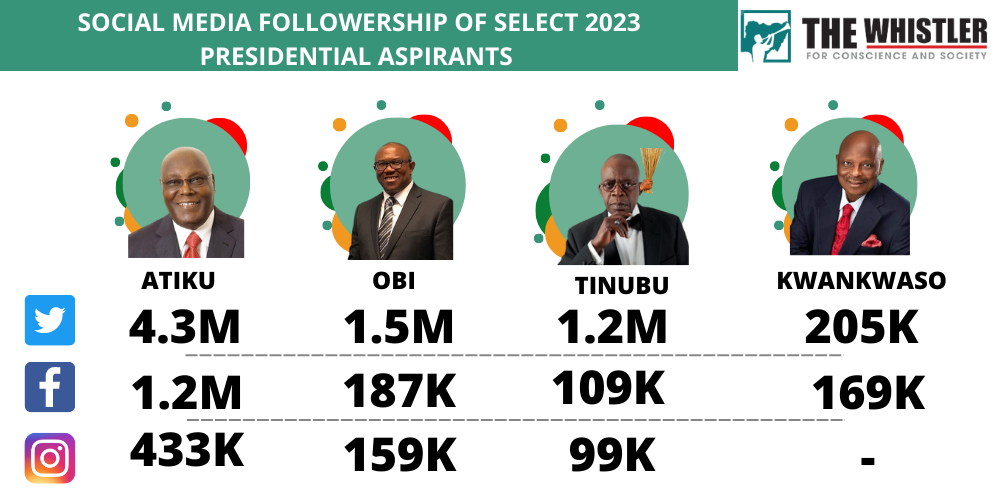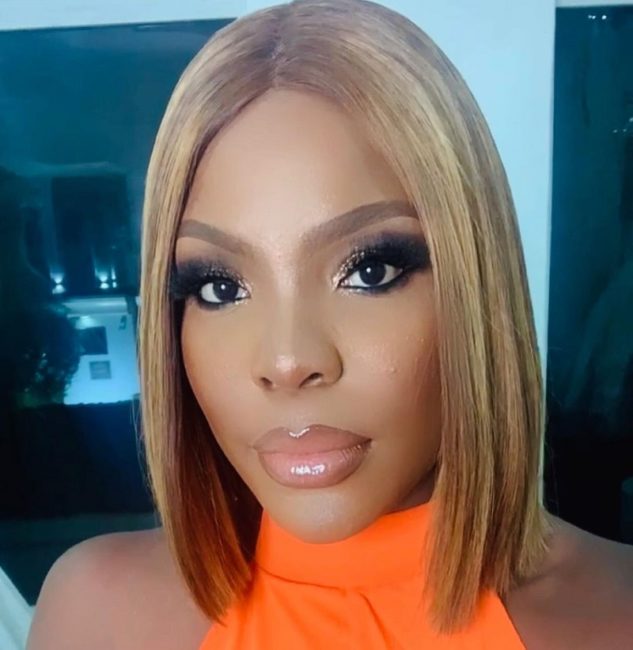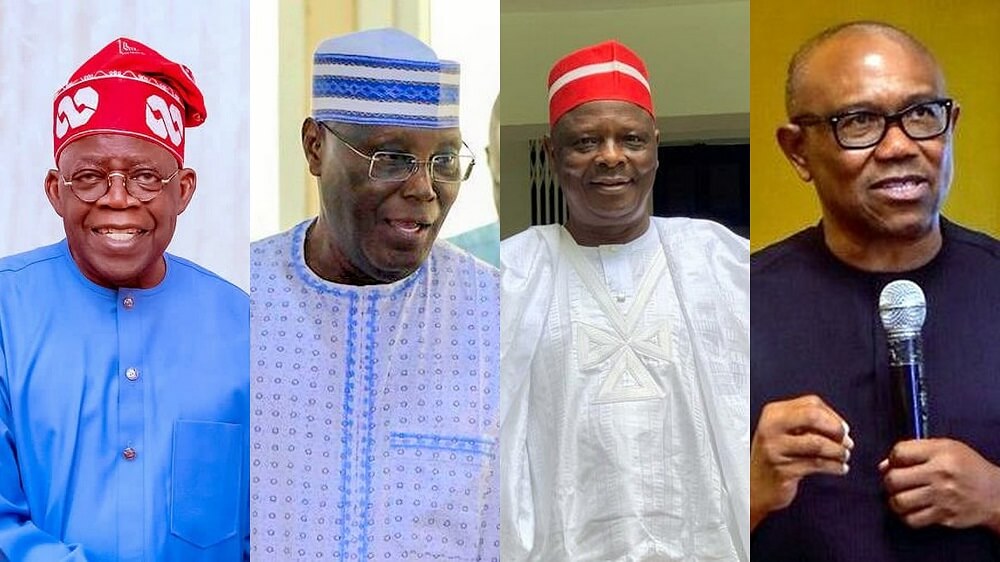2023: Does Large Social Media Followership Give Atiku, Obi, Tinubu Edge Over Other Presidential Candidates? Experts Disagree
Popularity is a critical success factor for a politician to win an election but having a huge social media followership doesn’t necessarily guarantee that a political aspirant has a human audience, experts have told THE WHISTLER.
In this report, THE WHISTLER looks at Nigeria’s four leading presidential aspirants and sampled the opinions of public relations and social media experts on what a huge followership or lack of one means for the ambition of the aspirants.
Advertisement
The aspirants are those who emerged as 2023 presidential candidates in the primary elections of their respective political parties.
They are Atiku Abubakar, the Peoples Democratic Party (6,029,103 followers); Peter Obi, the Labour Party (1,857,811 followers); Asiwaju Bola Tinubu, the ruling All Progressives Congress (1,474,545); and Rabiu Kwankwaso, the New Nigeria Peoples Party (205,543 followers).
This website found that the four aspirants have combined followership of 9.7 million across Facebook, Twitter, and Instagram, which are the three leading social media networks where they have a huge presence. This excludes WhatsApp, where over 93 million Nigerians are said to be active, and YouTube.

Advertisement
As of July 2021, there were approximately 43 million social network users in Nigeria, and the figure is projected to grow to 103 million users in 2026, according to Statista.com
At some point, supporters of political aspirants have touted the number of followership commanded by their candidates as being reflective of such candidate’s popularity or acceptability by the electorates.
Also, politicians such as Nigeria’s former Senate President, Bukola Saraki, and Raymond Dokpesi, a chieftain of the PDP, had previously suggested that voting for a ‘mobile’ and ”digital president’ maybe a vote for a leader with competence.
“A new order requires a president that is mobile, digital, that has capacity that can plan for its people, that has a destination that he is taking his people to. Across the world people are waiting for when this new world order will come to Nigeria and the new order has come at this time,” Saraki had said ahead of the 2019 presidential election, adding that the country could not afford to make another mistake in leadership because the citizens need a leader with a vision.
Dokpesi, on his part, said old politicians “are now becoming analogue” and should start leaving the scene for “many brilliant, digital young men and women who can represent us very effectively”.
Advertisement
But speaking to THE WHISTLER in an interview, Aleladia Mirabel Emwanta, a communications strategist and founder of Lagos-based M.Inc PR agency, said having huge followership doesn’t mean that a person has an audience because huge numbers without a good campaign strategy would hardly do much for their campaigns.
“I don’t think the number really matters. It is more about how they engage with even the little that they might have, and what they do on the platforms is also very important.
“It is more about what they are doing content wise, how they are engaging with their community and the impact they are able to have through the use of the numbers they have,” said Mirabel who holds a law degree from the University of Nottingham, United Kingdom.
While noting that there’s no threshold for the number of followership aspirants should have, the PR consultant said “I would even say as a whole, the politicians have not really exploited social media as such.

Advertisement
“When they are doing campaigns, yes, they tend to be more active but after those campaigns what are they doing? How are they impacting their followership basically? For me, that’s what I would say is more important as opposed to the numbers. It goes across board, it’s not even limited to politicians because for someone who has a lot of followership but little engagement, there’s no point for the numbers.”
On whether being social media savvy or digitally inclined says anything about the contemporariness or ability of leaders to lead in a digital age, Mirabel said it tells little about “their leadership qualities”.
According to her, politicians “have teams and it’s really about the quality of their teams because for the age of most of our politicians, they are older and maybe they don’t even have the time to get the skills or training for the digital age.
“But that’s where your team comes in to be able to tell you that, ‘hey, let’s organize this online conference or go in a chat room and discuss with the people’,” she added, noting however that fluidity may also be important in terms of the quality of such leader’s personality.
“We want somebody who is fluid enough and smart enough to go with the relevant times. Maybe they are not as sound, but they understand social media and understand its importance. We’re not looking for people who are social media savvy but we are looking for people who understand that this is a digital age and they are willing to work with their team to that effect. For me, that’s what’s more important than the actual leader being social media savvy.”
Because Nigeria’s population is more youthful than it is advanced in age, she noted that the best way to reach and engage with them is through the digital media.
She advised politicians with no presence on social media to “update because if you are trying to create impact on a global scale, you need to have a digital profile. A digital profile is what people all over the world are going to recognize you with. They are not going to come all the way to your local government or state to find out who you are. So, it is very important that they at least have a digital identity. It is important for every person, not just politicians because we are in a global world where to close business deals or get jobs, people are becoming less interested in seeing you face to face.”
Mirabel further advised that in engaging with citizens, politicians have to be very careful with the sort of messages they are passing across on those platforms because they can easily incite violence.
“Like you rightly said, using Donald Trump as an example, he is savvy, but we all know the kind of message he sends across and the kind of impression he leaves and that’s why content is important. So, does social media increase their chances? Well not in itself but it does create awareness for the campaign,” she added.
Corroborating Mirabel, Funmi Ajala, the Director of Community Development Project at the ICT University Foundation USA fellowship, said “having a huge followership does not result in potential leadership” because social media is mainly an engagement and opinion drawing tool.
Ajala, however, noted that not having social media presence “can affect in the sense of not understanding what the young demographics really want. Social media platforms are mainly information gathering and information dissemination tools, while some politicians take it further as an engagement tool.”
She added, “A lot of people on social media do not have their PVC (Permanent Voters Card) and neither do they go out to vote. Social media is a form of exercising our rights behind a keyboard and being faceless.”



